八年级英语下册Unit4Whydon’tyoutalktoyourparents第1课时SectionA1a_2d教案新版人教新目标版
Unit4whydontyoutalktoyourparents教案
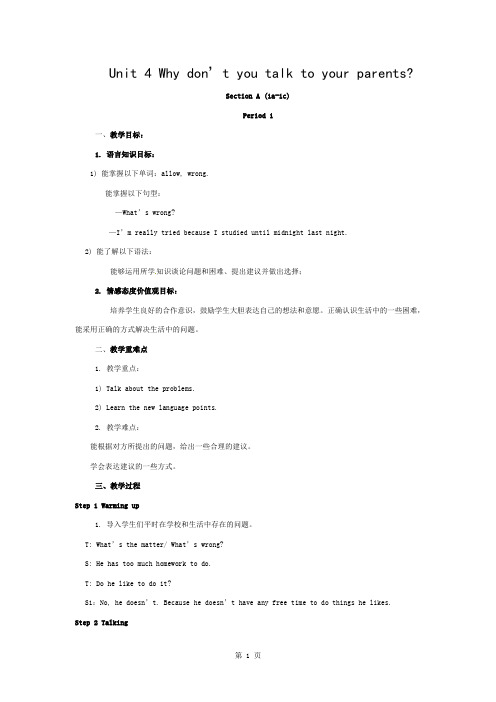
Unit 4 Why don’t you talk to your parents?Section A (1a-1c)Period 1一、教学目标:1. 语言知识目标:1) 能掌握以下单词:allow, wrong.能掌握以下句型:—What’s wrong?—I’m reall y tried because I studied until midnight last night.2) 能了解以下语法:能够运用所学知识谈论问题和困难、提出建议并做出选择;2. 情感态度价值观目标:培养学生良好的合作意识,鼓励学生大胆表达自己的想法和意愿。
正确认识生活中的一些困难,能采用正确的方式解决生活中的问题。
二、教学重难点1. 教学重点:1) Talk about the problems.2) Learn the new language points.2. 教学难点:能根据对方所提出的问题,给出一些合理的建议。
学会表达建议的一些方式。
三、教学过程Step 1 Warming up1. 导入学生们平时在学校和生活中存在的问题。
T: What’s the matter/ What’s wrong?S: He has too much homework to do.T: Do he like to do it?S1:No, he doesn’t. Because he doesn’t have any free time to do things he likes.Step 2 Talking1. Look at these problems. Do you think they are serious or not? Ss discuss with their partnersand give some advice.①I have to study too much so I don’t get enough sleep.②I have too much homework so I don’t have any free time to do things I like.③My parents don’t allow me to hang out with my f riends.④ I have too many after-school classes.⑤ I got into a fight with my best friend.Step 3 Listening1. T: Tell Ss to read the sentences in 1a again. Make sure they know the meaning of the sentences.2. Play the recording for the Ss to listen and circle the problems you hear in 1a.3. Play the recording again. Check the answers with the Ss.Step 4 Pair work1. Let Ss read the conversation in the box.2. Use the information in 1a to make other conversations.3. Let some pairs act out their conversations.e.g. A: What’s wrong?B: I’m really tied because I studied until midnight last night.A: Why don’t you go to sleep earlier this evening?4. Language points1) allow v. 允许;准许allow sb. (not)to do sth. (不)允许某人做某事e.g. My pare nts don’t allow me to stay up late. 我父母不允许我熬夜。
新人教版八年级英语下册unit4全单元教案
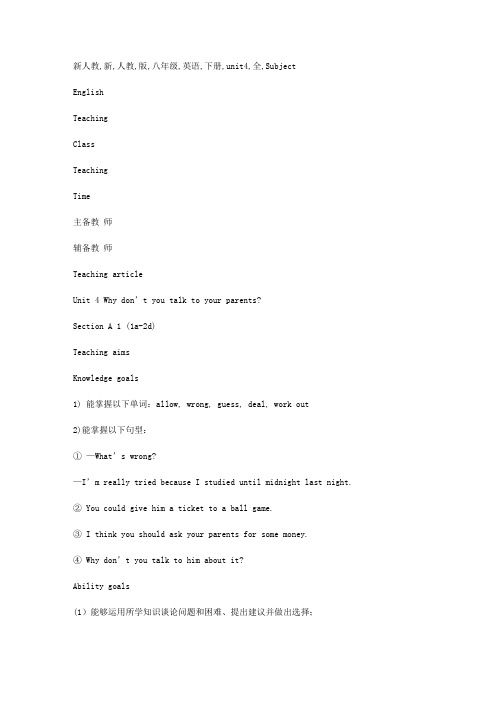
新人教,新,人教,版,八年级,英语,下册,unit4,全,SubjectEnglishTeachingClassTeachingTime主备教师辅备教师Teaching articleUnit 4 Why don’t you talk to your parents?Section A 1 (1a-2d)Teaching aimsKnowledge goals1) 能掌握以下单词:allow, wrong, guess, deal, work out2)能掌握以下句型:① —What’s wrong?—I’m really tried because I studied until midnight last night.② You could give him a ticket to a ball game.③ I think you should ask your parents for some money.④ Why don’t you talk to him about it?Ability goals(1)能够运用所学知识谈论问题和困难、提出建议并做出选择;(2)能根据对方所提出的问题,给出一些合理的建议。
Moral goals培养学生良好的合作意识,鼓励学生大胆表达自己的想法和意愿。
正确认识生活中的一些困难,能采用正确的方式解决生活中的问题。
Teaching keys1) Talk about the problems.2) Learn the new language points.Teaching difficult1、能根据对方所提出的问题,给出一些合理的建议。
2、学会表达建议的一些方式。
Teaching aidsA tape recorder. Some picturesTeaching methodsListening and practicing methods, pair work, Task-Based Learning method.Teaching proceduresItemsTeacher ActivityStudents, ActivityTeaching proceduresStep 1 Warming up1. 导入学生们平时在学校和生活中存在的问题。
新人教版八年级英语下册教案 Unit 4 Why don’t you talk to your parents教案1
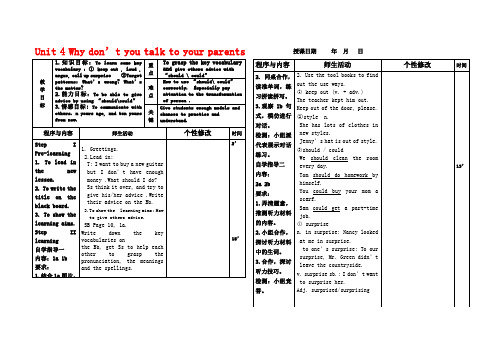
Keep out of the door, please.
style n.
She has lots of clothes in new styles.
Jenny’s hat is out of style.
should / could
Weshould cleanthe room every day.
3. To show the learning aims.
Step II learning
自学指导一
内容:1a 1b
要求:
1.结合1a图片,找出生词。
1. Greetings.
2.Lead in:
T: I want to buy a new guitar but I don’t have enough money .What should I do?
the Bb, get Ss to help each other to grasp the pronunciation, the meanings and the spellings.
2’
15’
授课日期年月日
程序与内容
师生活动
个性修改
时间
2.同桌合作,读准单词,练习拼读拼写。
3.观察1b句式,模仿进行对话。
2. SB Page 10-11, 1b .2a. 2b.
Play the tape twice .Ss circle the problems they hear.
Play the tape a third time .Check the answers.
Then help students understand and perceive when / how to use should or could.
Unit4Whydon'tyoutalktoyourparents?教案
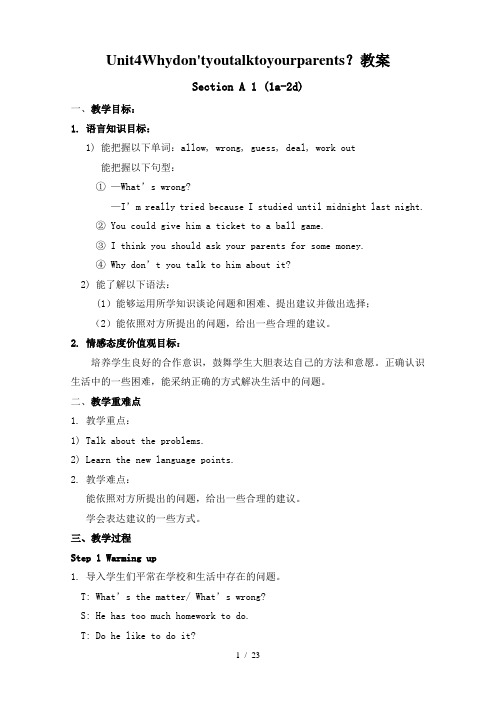
Unit4Whydon'tyoutalktoyourparents?教案Section A 1 (1a-2d)一、教学目标:1. 语言知识目标:1) 能把握以下单词:allow, wrong, guess, deal, work out能把握以下句型:① —What’s wrong?—I’m reall y tried because I studied until midnight last night.② You could give him a ticket to a ball game.③ I think you should ask your parents for some money.④ Why don’t you talk to him about it?2) 能了解以下语法:(1)能够运用所学知识谈论问题和困难、提出建议并做出选择;(2)能依照对方所提出的问题,给出一些合理的建议。
2. 情感态度价值观目标:培养学生良好的合作意识,鼓舞学生大胆表达自己的方法和意愿。
正确认识生活中的一些困难,能采纳正确的方式解决生活中的问题。
二、教学重难点1. 教学重点:1) Talk about the problems.2) Learn the new language points.2. 教学难点:能依照对方所提出的问题,给出一些合理的建议。
学会表达建议的一些方式。
三、教学过程Step 1 Warming up1. 导入学生们平常在学校和生活中存在的问题。
T: What’s the matter/What’s wrong?S: He has too much homework to do.T: Do he like to do it?S1:No, he doesn’t. Because he doesn’t have any free time to do things he likes.…Step 2 Talking1. Look at these problems. Do you think they are serious or not? Ss discuss with their partners and give some advice.① I h ave to study too much so I don’t get enough sleep.② I have too much homework so I don’t have any free time to do thingsI like.③ My parents don’t allow me to hang out with my friends.④ I have too many after-school classes.⑤ I got into a fight with my best friend.Step 3 Listening1. T: Tell Ss to read the sentences in 1a again. Make sure they know themeaning of the sentences.2. Play the recording for the Ss to listen and circle the problems you hear in 1a.3. Play the recording again. Check the answers with the Ss.Step 4 Pair work1. Let Ss read the conversation in the box.2. Use the information in 1a to make other conversations.3. Let some pairs act out their conversations.e.g. A: What’s wrong?B: I’m really tied because I studied until midnight last night.A: Why don’t you go to sleep earlier this evening?4. Language points1) allow v. 承诺;准许allow sb. (not)to do sth. (不)承诺某人做某事e.g. My parents don’t allow me to stay up late. 我父母不承诺我熬夜。
八年级英语下册教案:Unit4 Why don't you talk to your parents
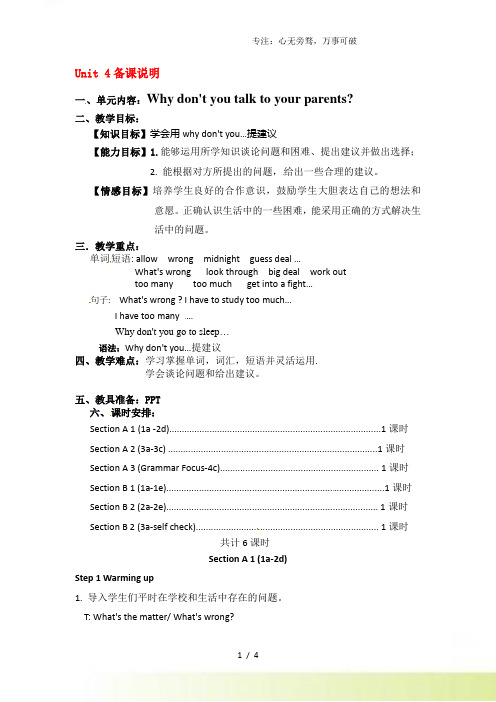
Unit 4备课说明一、单元内容:Why don't you talk to your parents?二、教学目标:【知识目标】学会用why don't you…提建议【能力目标】1.能够运用所学知识谈论问题和困难、提出建议并做出选择;2. 能根据对方所提出的问题,给出一些合理的建议。
【情感目标】培养学生良好的合作意识,鼓励学生大胆表达自己的想法和意愿。
正确认识生活中的一些困难,能采用正确的方式解决生活中的问题。
三.教学重点:单词短语: allow wrong midnight guess deal …What's wrong look through big deal work outtoo many too much get into a fight…句子:What's wrong ? I have to study too much…I have too many …Why don't you go to slee p…语法:W hy don't you…提建议四、教学难点:学习掌握单词,词汇,短语并灵活运用.学会谈论问题和给出建议。
五、教具准备:PPT六、课时安排:Section A 1 (1a -2d)....................................................................................1课时Section A 2 (3a-3c) ...................................................................................1课时Section A 3 (Grammar Focus-4c)............................................................... 1课时Section B 1 (1a-1e)......................................................................................1课时Section B 2 (2a-2e).................................................................................... 1课时Section B 2 (3a-self check)........................................................................ 1课时共计6课时Section A 1 (1a-2d)Step 1 Warming up1. 导入学生们平时在学校和生活中存在的问题。
人教版八年级英语下册课件Unit 4 Section A (1a~2d)

A. allow
B. allowed
C.not allowed
2. 我父母不允许我晚上出去。(根据汉语意思完成句子,
词数不限)
My parents don’t allow me to go out at night.
“find+sb.+宾语补足语”的用法 “find+sb.+宾语补足语”意为“发现某人……”,其中宾 语补足语可由分词、形容词、名词短语、介词短语或不 定式充当。 1. find sb. / sth.doing (现在分词) sth.,意为“发现某人 / 某物正在做某事”。如: I found him stealing my mobile phone. 我发现他正在偷 我的手机。
2. 几乎没有人可以解决这个问题。 Almost no one can work out this problem.
3. 约翰过去为我工作。 John used to work for me.
4. 我的妈妈是一名护士。 My mother works as a nurse.
一、根据句意及首字母或中文提示,用单词的适当形式 填空 1. What’s wrong with Tina. She looks very pale.
It’s wrong of you to look through others’ things
without being allowed.
7. 昨晚我打电话给你,可没人接。
I tried to call you up
last night, but no
one answered the phone .
9. 重要的事 big deal
10. 成功地发展;解决 work out
Unit 4 Section A 1a-2d 听说课 八年级英语下册(人教版新目标)
New words
allow v.允许; wrong adj. 有毛病;What’s wrong? look through
准许
错误的
哪儿不舒服? 快速查看;浏览
guess v. 猜测; deal n.协议; big deal
估计
交易
重要的事
work out 成功地 发展;解决
Do you have any problems in your daily life? Talk about your problems.
1. study too much
2. don’t have enough sleep
3. have too much homework
4. don’t have any free time
5. have too many after-school classes 6. get a fight with my best friend
things I like.
My parents don't allow me to hang out with my frinds.
Why don't you go to sleep earlier this evening
But why don't you forget about it so that you can be friends again? 2. 在听力活动中,能够通过选择句子,听力填空等听懂谈论青少年问题 和建议的对话。 4.能够谈论自身存在的问题困难,并就别人的困惑正确使用You could …. You should ….Why don't you...?句型给出建议。 5. 主动与别人交流,采用正确的方式解决生活中的问题 。
人教版八年级下册英语 Unit 4 SectionA (1a-2d)
5. You
2a
takehimtotheballgame. ( )
1. Youcould 2. Youshould 3. Youshould say you're a
sorryc.ou(ld 4. Youcould
5. You
Advice
write him a ldetter.(
)
call himeup. (
)
talk to him so that you can
)
c
go to his house. ( b )
take him to the ball game.
2a
Boy 1:Hey, Peter, what’s wrong? Boy 2:I had a fight with my best friend. What should I do? Boy 1:Well, you could write him a letter. Boy 2:I don’t think so, although it’s a good idea. I’m just not very good at writing letters. Boy 1:Maybe you should call him up. Boy 2:No, I don’t want to talk about it on the phone.
b. I don't want to wait that long. c. I don't want to surprise him. d. I'm not good at writing letters. e. I don't want to talk about it on the phone.
- 1、下载文档前请自行甄别文档内容的完整性,平台不提供额外的编辑、内容补充、找答案等附加服务。
- 2、"仅部分预览"的文档,不可在线预览部分如存在完整性等问题,可反馈申请退款(可完整预览的文档不适用该条件!)。
- 3、如文档侵犯您的权益,请联系客服反馈,我们会尽快为您处理(人工客服工作时间:9:00-18:30)。
Unit 4 Why don’t you talk to your parents 课题 Unit 4 Why don’t you talk to your parents? Section A 1 (1a-2d) 课型 新授课
教学目标
1. 语言知识目标: 1) 能掌握以下单词:allow, wrong, guess, deal, work out 能掌握以下句型: ① —What’s wrong? —I’m really tried because I studied until midnight last night. ② You could give him a ticket to a ball game. ③ I think you should ask your parents for some money. ④ Why don’t you talk to him about it? 2) 能了解以下语法: (1)能够运用所学知识谈论问题和困难、提出建议并做出选择; (2)能根据对方所提出的问题,给出一些合理的建议。 2. 情感态度价值观目标: 培养学生良好的合作意识,鼓励学生大胆表达自己的想法和意愿。正确认识生活中的一些困难,能采用正确的方式解决生活中的问题。
重点 1) Talk about the problems. 2) Learn the new language points.
难点 能根据对方所提出的问题,给出一些合理的建议。 学会表达建议的一些方式。 教学用具 多媒体
教学环节 说 明 二次备课
复习 Review 新课导入 Lead in 课 程 讲 授 Step 1 Warming up 1. 导入学生们平时在学校和生活中存在的问题。 T: What’s the matter/ What’s wrong? S: He has too much homework to do. T: Do he like to do it? S1:No, he doesn’t. Because he doesn’t have any free time to do things he likes. … Step 2 Talking 1. Look at these problems. Do you think they are serious or not? Ss discuss with their partners and give some advice. ① I have to study too much so I don’t get enough sleep. ② I have too much homework so I don’t have any free time to do things I like. ③ My parents don’t allow me to hang out with my friends. ④ I have too many after-school classes. ⑤ I got into a fight with my best friend. Step 3 Listening 1. T: Tell Ss to read the sentences in 1a again. Make sure they know the meaning of the sentences. 2. Play the recording for the Ss to listen and circle the problems you hear in 1a. 3. Play the recording again. Check the answers with the Ss. Step 4 Pair work 1. Let Ss read the conversation in the box. 2. Use the information in 1a to make other conversations. 3. Let some pairs act out their conversations. e.g. A: What’s wrong? B: I’m really tied because I studied until midnight last night. A: Why don’t you go to sleep earlier this evening? 4. Language points 1) allow v. 允许;准许 allow sb. (not) to do sth. (不)允许某人做某事 e.g. My parents don’t allow me to stay up late. 我父母不允许我熬夜。 Mr. Smith allowed Mike to drive there. 史密斯先生允许迈克开车去那里。 2) wrong adj. 错误的;不对的 = not right e.g. Some words on the advertisement are wrong. 广告上的一些字错了。 Step 5 Listening Work on 2a: T: Peter has some problems. What advice does his friend give him? Fill in the blanks with could or should. 1. Let Ss read the sentences in 2a. 2. Play the recording for the Ss to listen and write the words in the blank. 3. Play the recording again to check the answers. Work on 2b: 1. Let Ss read the sentences below. Explain some main sentences for the Ss. Make sure they know the meaning of each sentence. 2. Play the recording for the Ss to write the letters (a-e) next to the advice in 2a. 3. Play the recording again to check the answers. Answers: 1. d 2. e 3. a 4. c 5. b Exercise: Listen again. Fill in the blanks. Boy 2 had a ______ with his best friend. He could ______ him a letter. But he isn’t good at writing letters. He ______ call him ____, but he doesn’t want to talk about it on the ______. He ______ talk to him so that he can say he’s sorry but it’s not ____. He ______go to his house but he doesn’t want to _______ him. He could take him to the _____________, but he doesn’t want to wait that long. Step 6 Pair work 1. Tell Ss to make a conversation using the information in 2a and 2b. 2. Let one pair to read out their conversation first. 3. e.g. A: What’s the matter, Peter? B: I had a fight with my best friend. What should I do? A: Well, you should call him so that you can say you’re sorry. B: But I don’t want to talk about it on the phone. 4. Ss act the conversation in pairs. Ask some pairs to act out their conversations. Step 7 Role-play 1. Ss read the conversations and try to understand the meaning. 2. Read the conversation after the teacher. 3. Practice the conversation with their partner. Then let some pairs to act out the conversation. 4. Explain some new words and main points in the conversation. (1) guess e.g. Let us guess the height of the building. 让我们来猜一下这个建筑物的高度。 (2) big deal, deal big deal是英语中的一个固定搭配,表示 “重要的事情或状况”,多用于非正式交流。作否定用法时,常说It’s not a big deal或It’s no big deal.表示说话人并不认为某事有什么了
